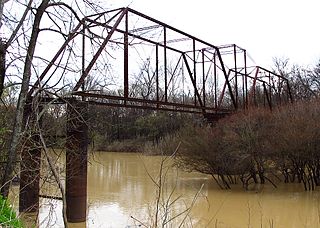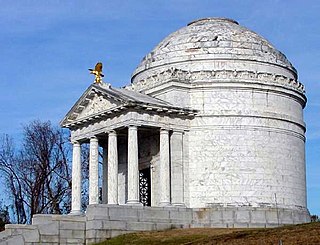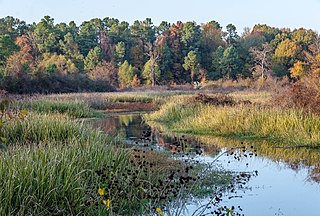Related Research Articles

Love County is a county on the southern border of the U.S. state of Oklahoma. As of the 2020 census, the population was 10,146. Its county seat is Marietta. The county was created at statehood in 1907 and named for Overton Love, a prominent Chickasaw farmer, entrepreneur and politician.

Chickasaw County is a county located in the U.S. state of Mississippi. As of the 2020 census, the population was 17,106. Its county seats are Houston and Okolona. The county is named for the Chickasaw people, who lived in this area for hundreds of years. Most were forcibly removed to Indian Territory in the 1830s, but some remained and became citizens of the state and the United States.

Bolivar County is a county located on the western border of the U.S. state of Mississippi. As of the 2020 census, the population was 30,985. Its county seats are Rosedale and Cleveland. The county is named in honor of Simón Bolívar, early 19th-century leader of the liberation of several South American territories from Spain.

The Sunflower River is one of the main tributaries of the Yazoo River in the U.S. state of Mississippi. It is navigable by barge for 50 miles. It rises in DeSoto County, Mississippi near the Tennessee border and flows south for 100 miles to the Yazoo River, a major tributary of the Mississippi River. At Clarksdale, the county seat of Coahoma County, the annual Sunflower River Blues & Gospel Festival is held.

The Mobile River is located in southern Alabama in the United States. Formed out of the confluence of the Tombigbee and Alabama rivers, the approximately 45-mile-long (72 km) river drains an area of 44,000 square miles (110,000 km2) of Alabama, with a watershed extending into Mississippi, Georgia, and Tennessee. Its drainage basin is the fourth-largest of primary stream drainage basins entirely in the United States. The river has historically provided the principal navigational access for Alabama. Since construction of the Tennessee-Tombigbee Waterway, it also provides an alternative route into the Ohio River watershed.

Vicksburg National Military Park preserves the site of the American Civil War Battle of Vicksburg, waged from March 29 to July 4, 1863. The park, located in Vicksburg, Mississippi, flanking the Mississippi River, also commemorates the greater Vicksburg Campaign which led up to the battle. Reconstructed forts and trenches evoke memories of the 47-day siege that ended in the surrender of the city. Victory here and at Port Hudson, farther south in Louisiana, gave the Union control of the Mississippi River.

The Battle of Chickasaw Bayou, also called the Battle of Walnut Hills, fought December 26–29, 1862, was the opening engagement of the Vicksburg Campaign during the American Civil War. Confederate forces under Lt. Gen. John C. Pemberton repulsed an advance by Union Maj. Gen. William T. Sherman that was intended to lead to the capture of Vicksburg, Mississippi.

Mississippi Highway 32 is a state highway in northern Mississippi it runs from east to west for 152.0 miles (244.6 km), serving the counties of Bolivar, Sunflower, Tallahatchie, Yalobusha, Calhoun, and Chickasaw. The publicly accessible portion of MS 32 is divided into two sections, the first of which begins near Perthshire and runs eastward to the rear entrance of the Mississippi State Penitentiary (MSP). The second section begins at the main entrance of MSP and runs eastward to MS 32's terminus in Okolona. A private portion of MS 32 runs from the main entrance of MSP to the rear entrance of MSP.

Bayou Bartholomew is the longest bayou in the world, meandering approximately 364 miles (586 km) in the U.S. states of Arkansas and Louisiana.
Loggy Bayou is a 17.3-mile-long (27.8 km) stream in northwestern Louisiana which connects Lake Bistineau with the Red River. Bistineau is the reservoir of Dorcheat Bayou, which flows 115 miles (185 km) southward from Nevada County, Arkansas, into Webster Parish. Loggy Bayou flows through south Bossier Parish, west of Ringgold, in a southerly direction through Bienville Parish, and into Red River Parish, where north of Coushatta it joins the Red River, a tributary of the Mississippi. At East Point, LA, the river has a mean annual discharge of 1,960 cubic feet per second.

The Steele's Bayou expedition was a joint operation of Major General Ulysses S. Grant's Army of the Tennessee and Rear Admiral David D. Porter's Mississippi River Squadron, conducted as a part of the Vicksburg Campaign of the American Civil War. Its aim was to move Union forces from the Mississippi River to a point on the Yazoo River upstream of Confederate Lieutenant General John C. Pemberton's defenses of Vicksburg. To avoid enemy artillery in place on the bluffs to the east of the city, the expedition would leave the Yazoo and proceed indirectly on a route through a series of waterways in the flood plain to the east of the Mississippi.
Bibalucta Creek is a stream in the U.S. state of Mississippi.
Choctaw Creek is a stream in the U.S. state of Mississippi. It is a tributary to Bayou Pierre.
Choctaw Creek is a stream in the U.S. state of Mississippi. It is a tributary to Bayou Pierre.
Hickahala Creek is a stream in the U.S. state of Mississippi.
Hushpuckena Creek is a stream in the U.S. state of Mississippi.
Pelucia Bayou is a stream in the U.S. state of Mississippi.
Skillikalia Bayou is a stream in the U.S. state of Mississippi.
Tippo Bayou is a stream in the U.S. state of Mississippi.
Tokeba Bayou is a stream in the U.S. state of Mississippi.
References
- ↑ U.S. Geological Survey Geographic Names Information System: Chickasaw Bayou
- ↑ Baca, Keith A. (2007). Native American Place Names in Mississippi. University Press of Mississippi. p. 22. ISBN 978-1-60473-483-6.
- ↑ "Chickasaw Bayou" . Retrieved 9 July 2019.
32°26′34″N90°51′26″W / 32.4426425°N 90.8573259°W